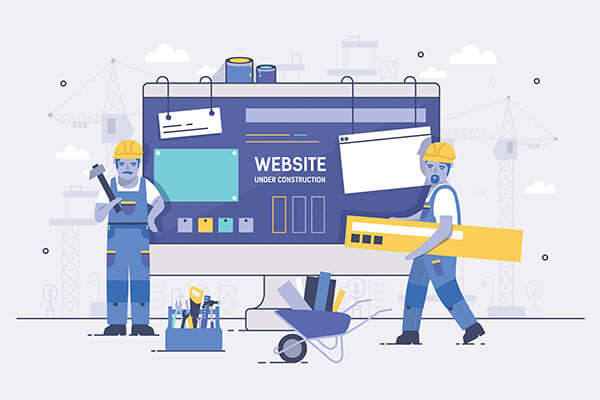
Many individuals feel accomplished after owning a business website; so much so that they even forget to set up security defenses around it. On the other hand, most of the people deliberately skip this step because why would hackers hack small-scale business models, right? You would be surprised to learn that 43% of hackers target small businesses. Besides, 60% of small-scale companies go out of business within six months of a cyberattack.
The most significant factors that contribute to weak website security are poor web hosting and cheap maintenance. Even if you are not hosting your website on any Content Management System, you still need to focus on these two factors to fortify your website.
Poor Web Hosting: A Ticking Time Bomb

There are two types of hosting, i.e., managed and shared hosting. Managed hosting is controlled by professionals where the ultimate focus is on individual caring. On the other hand, shared hosting is all about managing multiple sites together.
The managed hosting is expensive and provides better security to the hosted websites. However, the hosting companies providing shared services often neglect the security aspect of the hosted sites. But let us not pit one hosting platform against the other because that is not the point!
When choosing a hosting platform, companies often decide on going with the cheapest option to save some money. However, this is one place where enterprises should not care about the price tag since, in hosting language, cheaper always translates to sub-par services.
Before opting for any expensive hosting, keep in mind that not all hosting platforms are created equal. This means that despite a hefty price tag, a hosting platform might still fail to meet with your demands. A good rule of thumb is to analyze every hosting platform and look out for the following:
- Server-side encryption and firewall
- Apache or NGINX web servers
- CDN or SSL security certificates
- Anti-malware and antivirus software
- On-site security
Often, shared hosting is synonymous with poor hosting. This is because multiple websites are being hosted on a single platform through a single user. Even if your website has various security certificates in places, all of it will be useless in case of an attack due to site cross-contamination.
Site Maintenance: A Vital Strategy

Regularly updating and performing maintenance checks on your website is a crucial step, especially if Content Management Systems are involved. The thing is, the hackers are always on the lookout for vulnerabilities, and daily maintenance helps in stopping the attacks in their tracks.
If your website is hosted on WordPress or any other similar CMS, it is crucial to ensure that your website is running on the recent updates. When CMS spots certain vulnerabilities or security threats in their codes, updates are introduced as a way to get rid of all the faulty material. Not updating or regularly maintaining your website means that it is still running with the vulnerabilities and security threats. This provides hackers with a window to target such sites and steal crucial information.
So, simply by exploiting outdated software of any website, the hackers can not only cause you trouble, but it can cause problems for anyone who visits your website.
By properly maintaining your website, you can experience an increase in online traffic, get new visitors, boost SEO ranking, and provide a better overall customer experience!
How to Step Up Your Security Game?
Site maintenance and web hosting are not the only ways of protecting your site against unauthorized access. There are multiple other ways through which you can maximize the security of your website.
Protect your passwords
People often go with passwords which they can easily remember. However, when security is your biggest concern, you need to create a unique combination of digits and alphabets to secure your site.
Also, make it long and use special characters. Stay well-clear from easily guessable combinations such as your kid’s name or your birthday. On top of this, change your password after every six-month to add another layer of security. You can also use reliable password generators for this purpose.
Look out for SQL injections
SQL injection attacks take place when hackers inject rogue codes in your website to either manipulate or gain access to your databases. Generally, hackers can accomplish this feat when the websites have a URL parameter or a web form that enables other individuals to supply information.
There are many ways that could prevent SQL injections. However, the easiest way to deal with this is to utilize the parameterized queries. Through this way, you can ensure that your code has enough parameters that leave little to no room for cybercriminals to manipulate your site.
Avoid file uploads
Allowing users to upload files may seem innocent. However, it can prove to be a significant security risk. This is because the uploaded file could contain malicious scripts which could make your site vulnerable to security attacks.
The best thing in this scenario is to prevent users from executing all the files they upload on your server. Moreover, you can stop direct access to the uploaded files as well.
Use HTTPS
HTTPS is the green box that appears in the URL section of any webpage. This green box indicates that the specific website is secure and anyone can exchange sensitive information on that particular platform. You can achieve your HTTPS by investing in SSL certificates.
These certificates are economical, and the additional layer of security it provides can easily encourage the users to provide financial or personal information with ease.
Conclusion
Hackers are never fun since they not only ruin your reputation, but they also put your consumers’ safety at risk. Also, the legal action that takes place in the wake of an attack can prove to be a headache for many website owners. Nobody wants to end up in such a scenario; however, you are also not making it difficult for hackers if you have not considered any preventative measures!
Just like cars, websites also need proper maintenance and constant updates to perform properly. On top of this, they need to be taken care of in every aspect to provide your visitors with a great experience.
So, take our advice and never ignore security factors that could make your site susceptible to attacks. Trust us; your users will thank you for being considerate!


 Copyright 2000-2025, WebSitePulse. All rights reserved.
Copyright 2000-2025, WebSitePulse. All rights reserved.